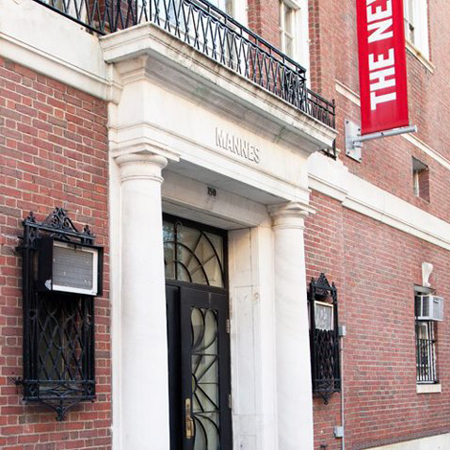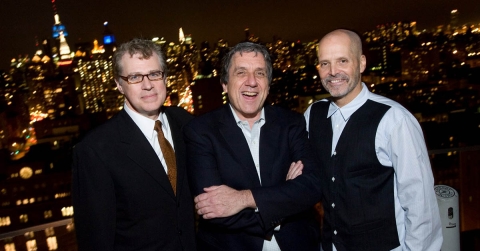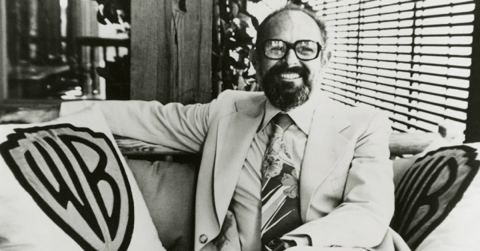Nonesuch Records President Bob Hurwitz gave the Keynote Address at the Recognition Ceremony celebrating the Mannes College The New School for Music Class of 2013, held earlier today at the school’s campus in New York City. Here are his remarks.
Nonesuch Records President Bob Hurwitz gave the Keynote Address at the Recognition Ceremony celebrating the Mannes College The New School for Music Class of 2013, held earlier today at the school’s campus in New York City. Below are his remarks.
It is a great honor to be here today. I want to thank Dean Kessler for inviting me and acknowledge the Board of Governors, the faculty and administration, the parents, and most importantly, the graduating class of 2013.
Nonesuch has had quite a significant history with the Mannes community. Richard Goode, who has recorded with us over a quarter century, is both a graduate and a long-time faculty member, as were two pianists—Ed Aldwell and Paul Jacobs—both of whom made extraordinary recordings that are an essential part of our catalogue. The beloved pianist Mieczyslaw Horszowski, long associated with Mannes, made four extraordinary records for Nonesuch towards the end of his career. Two more artists with whom we work—Jeremy Denk and Jeff Ziegler—are new to the Mannes faculty. John Zorn, one of the first artists I worked with at Nonesuch, will become a more active presence at the school in the future. It is artists like these who have helped us become the company we are today.
Like many of the parents sitting in this room today, I was a child of the ’60s. Many of us thought the world was irrevocably changing. I certainly did. Events like the Civil Rights Movement, the Vietnam War and the subsequent anti-war protest movement, the beginning of the women’s and gay rights movements, the proliferation of the drug culture, the cultural upheavals in all forms of music as well as in film, modern dance, art, photography and literature … all of these events defined an era that dramatically divided this country in a way that had never been experienced before or since. For those of us growing up then, it was a shocking, thrilling, dangerous, and often a wonderful time to be alive.
In the end, I’m not sure the events of the ’60s changed the world very much, but coming of age during that period had a deep and lasting impact on my life, as well as the lives of most of my friends. I have always thought that if I had been born ten years earlier, or ten years later, my life might have possibly followed a different course; but growing up in the ’60s shook me to the core and I doubt the previous or following decade would have had that kind of impact.
And when I think of the artists with whom I work, or others I know who grew up in that time, there is little question that the ’60s had a profound impact on the art that they have produced in their lifetimes.
I mention all of this because this graduating class belongs to a generation that is part of another deeply transformational moment in history, the first time this has happened, I believe, since the 1960s. The events of this current period, like those of the Depression, the Second World War or the a’60s, are so dramatic that I believe they will change the course of how those coming of age in this period will live in the future.
But while we can speak of the generation of the Second World War, or the ’60s, with big, bold headlines, the revolution that all of you in this graduating class are experiencing is far quieter, more subtle, almost invisible. We don’t even have a name for it. We read about it every day, we experience it through our mobile devices and our computers, through the Internet and social media. We look around and we see how it affects the economy and the job market, what we read and see, how we consume music and film, how we communicate and interact, and in some cases, how we create. For those graduating from school now—and whether you are a musician, or a history or English major, or want to be a teacher, or a film director, or a lawyer, journalist, architect or composer—the question of what will your career be like has never been as fraught and unclear. All of these professions are changing dramatically; we can only guess what the future holds.
You might ask: why is this relevant to this very specific audience? The Class of 2013 is made up of gifted musicians who spent years studying at an esteemed conservatory, learning about every facet of music, mastering their skills on instruments, or as singers, or conductors, or composers. You all have studied music that transcends this moment, and most, I would believe, have an expectation that much of your musical, professional, and artistic lives will be tied to the works that have helped define the classical music tradition for centuries.
Are the changes that we are seeing in every area of modern life relevant to a young artist who plans to dedicate their life to a world created by an incredible outpouring of genius that began centuries ago? Is there any profession where this kind of dramatic change is less relevant than that of the classical musician?
We read or hear stories, on a daily basis, about orchestras fighting for survival, about the collapse of the classical record business, about how young conservatory-trained musicians are now banding together to form modern music ensembles, or play in clubs where rock or folk musicians used to perform, about attempts to popularize classical music, or encourage people to tweet at performances, or how classical musicians need to use social media to further their careers.
The truth is we’ve been reading variations of these stories for the last five decades; some are simply updated to take into account new technological possibilities.
But there are other challenges to the young classical artist that are indisputably unique to this moment. There are two I am going to briefly talk about, and both have to do with the word attention.
I don’t think anyone in this room would dispute the fact that we live in a time when a person’s attention is becoming more and more divided. But there are few endeavors in life—both for the performer, and for the audience—where the idea of attention, or focused concentration, is more important than in the world of classical music.
And it’s not just about attention in the practice room or the concert hall, it’s about a time-challenged audience, with so many more options than ever in terms of how to spend their time, being willing to give itself to a profoundly important art form that has to be taken seriously and given time in order for it to be best appreciated.
How do we get people to pay attention to what we do when there are so many things going on, on a daily or even hourly basis, that pull them away? I remember growing up reading that the average American spent five to six hours a day in front of a television, which I found impossible to believe, but the reality is that today almost everyone we know spends far longer in front of a screen—whether it is an iPhone, an iPad, a computer, a television or movie screen. This is one of the consequences of the revolutionary time we live in. Can people find the time and space to live in a world that is not plugged in constantly? Because that is what your world needs to thrive.
There’s a second aspect of attention that many of you have thought a lot about over the last several years: how do I get people to pay attention, in the broadest sense, to what I do? We all have to make a living; we want to perform in public; as composers we want people to hear and play our music. How does a musician today come to the attention of their audience at a moment where so many things are vying for our attention?
We see this problem constantly at Nonesuch Records, for instance. We have, I believe, a positive message for the music community, we have a terrific website, but we are competing with 25,000 other terrific websites in all forms of art and media and commerce, just as we are competing with 40,000 new albums being released every year in this country. How does one get heard? How does one get noticed? While the tools provided by the Internet are beyond anything that we could have imagined in terms of getting our message across, in a world where the idea of curators, or filters, seems to be diminished, how does one ever get noticed or seen? How does one rise above the noise and the clutter of a celebrity-driven modern world where everyone is being assaulted on a constant basis? What do we have to do to be heard?
I actually believe that, in this instance, very little has changed in terms of the artist finding a pathway over the last 50 years, for with all of the hype and talk about modern media being essential for an artist who wants to have a career, the rules for a serious musician aren’t that different today than they were when I began my career in the record business in 1972 at Columbia Records. Then, as now, artists of great talent who persevered over the long run eventually found their way to their public. Sometimes it took time for the public to catch up with something that was new. Sometimes, it took a little longer to build up a following, which was often driven by word of mouth—informed music lovers telling their fellow informed music lovers about an artist who was special or had moved them deeply.
For instance, think about the classical music world and the impact of all of those shooting stars over the decades who won major competitions—some, like Murray Perahia, a Mannes graduate who won the Leeds Competition in 1972, have sustained and grown and had wonderful careers, but many others, in their time, were the equivalent of those musicians who get millions of hits on YouTube or become momentary phenomenons on Twitter. They were featured in major publications, some ended up being seen on late-night TV shows, but if you follow their careers 20 or 30 or 40 years later, the impact of that momentary sensation, which included fame and recording contracts and massive amounts of publicity, doesn’t mean very much if the career does not grow past that point. What seems far more important is consistency, integrity, and high musical values.
The pathway today is no different than it was in 1975. The most interesting musicians, and the ones with the most lasting careers, it seems, are often first discovered by other musicians, or teachers, or enlightened critics, or managers or agents or even people like me at record companies —we are all part of a close knit community that exists not only in classical or contemporary music, but in jazz, and many more progressive forms of popular music. We talk to one other, we share our enthusiasms about the new talents we happen to hear, and if we pay close attention over 10 or 20 years, we see these talents emerge and begin to have a deep and lasting relationship with the public. Even in today’s fractured world, in the long run, great quality, in the end, will endure.
---
During the ’60s, there was one musician—the great Canadian pianist Glenn Gould, a counter-culture hero to many of us—who seemed obsessed about the future of music and how it related to technology.
This led to one of his most famous pronouncements, a prediction that in 50 years the concert hall experience would be obsolete. That prediction was made 49 years ago, and I think it is finally safe to say that Gould got that one wrong.
One of Gould's criticisms of the concert hall experience was that the audience was not listening closely to what was coming from the stage; rather, it was there to collect a memory of an event, and that the audience had become a distraction for him as an artist. He believed, instead, that, with tremendous advances in recording technology, hearing a record on a state-of-the-art sound system in the home, one would have a far more intimate and vital experience in hearing a piece of music.
Gould’s notion of the “home concert hall” never came to pass but it actually has become a reality in the visual world—advances in television technology, for instance, have allowed people to have a high quality experience in their living rooms that was unimaginable in 1964. Meanwhile, the standards of music playback have deteriorated tremendously during the same time; while Gould anticipated the equivalent of a high-definition experience in listening to recordings, over the last two decades the importance of sound seems to have diminished in an almost shocking way. Audiences today seem to want convenience more than high fidelity.
What Gould could not have anticipated was the digital revolution that was just beginning when he died 30 years ago. And just as the experience of recording has changed during the time, slowly, subtly, the concert hall experience, or the meaning of a concert, has begun to change as well.
I remember years ago hearing the great American author John Updike in a conversation talking about why he went to church every week, even though he wasn’t particularly religious. He said, “I go because I like to sing, and because it gives me an hour and half each week where I can be alone with my thoughts, and shut off from the world.” While the concert hall is not a church or a temple or other type of religious institution, it can offer something similar for those wish to experience their deep love of music actively without the intrusions of the modern world. It has become more of a sanctuary from modern life than ever before. When I enter Carnegie Hall or the Village Vanguard or a small theater to hear music, I am fully conscious of leaving the world outside; all the things that are now a part of everyday life—mobile devices, computers, the Internet, e-mail—are, at least for a couple of hours, totally shut down.
And thus one of the great paradoxes of our time: at the moment when there is more noise and clutter than ever before, there is as great a need for you to be heard than at any time I can remember. Though all moments of transition in a society or culture seem to be fraught with challenges, they are also filled with possibilities. As all of you move into the next phase of your lives, know that for many people, like myself, your gifts as artists will continue to have a profoundly important meaning on our lives. For that we can express our gratitude and wish you all the very best as you go out and make a critical contribution to our modern world.
- Log in to post comments



